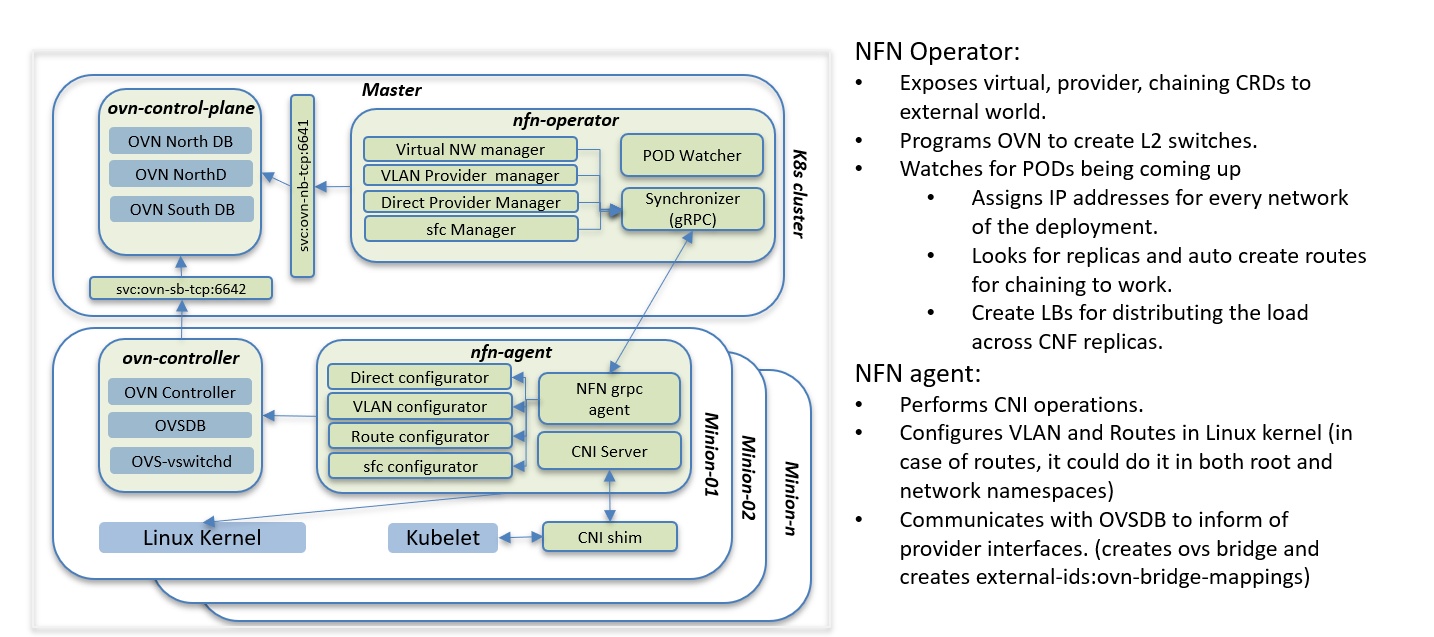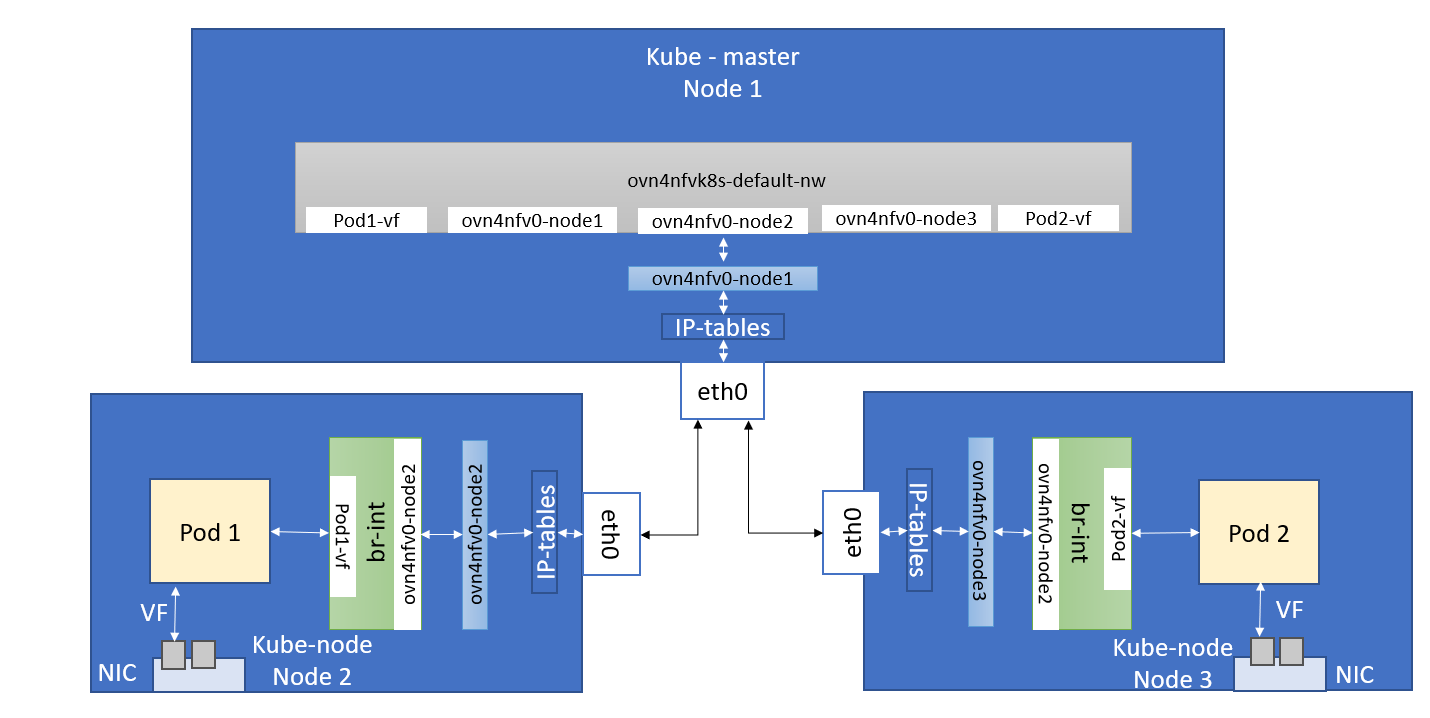Introduction:
Nodus is the Network controller designed based on the K8s controller framework and provides Open flow control based on OVN. This address OVN based Multiple Network creation, support Multiple network interfaces and support Virtual networking and Provider networkings.
Problem statement:
For 5 years, there has been quite the development in Cloud Native development to develop infrastructure to build and run the application that is fully automated, secure, flexible, performant, and resilient. This gives an opportunity in the evolution journey of the Monolith application to be decomposed into VMs and they are further decomposed into Microservices. This led to the path of Kubernetes to become a de-facto orchestration engine that facilitates this journey. During these courses, it was identified that Kubernetes networking and Container Networking are not addressing the need for Network evolutions in multiples cases starting from creating and managing the network infrastructure and automating it, and in general, it lacks Software Defined Networking (SDN) concepts such as programmable networks, decoupling the control and data planes, and scalability. Kubernetes networking has evolved so far only for the data ware centric cloud networking and it lacks network distribution to be suitable for Edge Cloud Networking
Nodus is the network controller in Kubernetes that addresses the need for Software Defined Networking that simplifies the network operations, builds programmable networks for greater flexibility and scalability.
Application transformation is one of the major objectives in the edge computing in the cloud-native evolution. Taking a PNF(Physical Network Function) or a VNF(Virtual Network Functions) to be ready to deploy in the edge is as challenging because the NFs(Network Functions) are composited into smaller microservices and these microservers will be deployed in the multiple edge location. Controlling the network traffics such as both control plane and data plane traffics in the scenarios is required to achieve low latency and multiple clusters networking
Architecture:
Nodus is a network controller and is designed to deliver Cloud-Native programmable networks that enable centralized control and network policy enforcement across physical and virtual networks.
Nodus support Kubernetes Networking, Open Virtual Network (OVN) based networking features to support virtual switching, virtual network abstractions and Service Function chaining. Nodus is planned to deliver features on Network Multi-tenancy, Network OoS, Network based Multicore Utilization, and TCFlower based network access.
Adding Multi cluster networking is a challenging requirement for Edge networking in the cloud-native world. As Kubernetes delegates all the networking features to CNI(Container Network Interfaces), and right now we have 16+ CNI types that offer various networking features starting from localhost to BGP networking. Having a single network controller for the Multiple Cluster within an edge and also across geo-distributed edge location is a requirement to create a virtual network, provider networks across the edges, and apply the same tuning parameter for the network resources in the edges.
Nodus is decomposed into 4 microservices, Network Function (NFN) Operators, Network Function (NFN) agent, OVN Control plane, and OVN controller.
Network Function (NFN) Operator is a Kubernetes Operator framework that hosts multiple Kubernetes Custom resource definition controller, and Kubernetes core API watchers to monitor and predicate the events to synchronize the network operations. It gets the input from the user, and it acts as an orchestration engine for Networking to create, manage virtual and physical network support for both VLAN and direct networking, Service Function chaining using OVN control plane and NFN agent.
Network Function (NFN) agent is a Kubernetes daemon set to get the command from Network Function (NFN) operator to do network plumbing works such as network configuration and managing the workloads network namespace in each host using Container Network Interfaces specs.
OVN control-plane hosts all the OVN Northbound API as the microservices and the OVN controller host all the OVN Southbound API and OVS virtual switch as the microservices. OVN control plane gets the network abstraction configuration from NFN operators and translates network configuration into Openflow to implement distributed logical switches, Access control lists for network policy implementations, Service function chaining, and distributed virtual routers.
Features:
InFinite Network Resources:
Virtual Networks:
Nodus uses the NFN operator to define the virtual network CRs that will create a OVN networking for virtual networking as defined in the CR.
apiVersion: k8splugin.opnfv.org/v1alpha1 kind: Network metadata: name: ovn-priv-net spec: cniType: ovn4nfv ipv4subnets: - subnet: 172.16.33.0/24 name: subnet1 gateway: 172.16.33.1/24 excludeIps: 172.16.33.2 172.16.33.5..172.16.33.10
This CR defines the OVN networking and provides the gateway and exclude IPs to be reserved for any internal static IP address assignment.
Provider Networks:
Provider network supports both VLAN and direct provider networking
apiVersion: k8s.plugin.opnfv.org/v1alpha1
kind: ProviderNetwork
metadata:
name: pnetwork
spec:
cniType: ovn4nfv
ipv4Subnets:
- subnet: 172.16.33.0/24
name: subnet1
gateway: 172.16.33.1/24
excludeIps: 172.16.33.2 172.16.33.5..172.16.33.10
providerNetType: VLAN
vlan:
vlanId: "100"
providerInterfaceName: eth0
logicalInterfaceName: eth0.100
vlanNodeSelector: specific
nodeLabelList:
- kubernetes.io/hostname=ubuntu18
The major change between the VLAN provider network and direct provide networks is the VLAN information is provided in the VLAN CR and they are excluded in the direct provider
apiVersion: k8s.plugin.opnfv.org/v1alpha1
kind: ProviderNetwork
metadata:
name: directpnetwork
spec:
cniType: ovn4nfv
ipv4Subnets:
- subnet: 172.16.34.0/24
name: subnet2
gateway: 172.16.34.1/24
excludeIps: 172.16.34.2 172.16.34.5..172.16.34.10
providerNetType: DIRECT
direct:
providerInterfaceName: eth1.
directNodeSelector: specific
nodeLabelList:
- kubernetes.io/hostname=ubuntu18
Service Function Chaining:
apiVersion: k8splugin.opnfv.org/v1alpha1
kind: NetworkChaining
metadata:
name: chain1
namespace: vFW
spec:
type: Routing
routingSpec:
leftNetwork:
- networkName: ovn-provider1
gatewayIP: 10.1.5.1
subnet: 10.1.5.0/24
rightNetwork:
- networkName: ovn-provider1
gatewayIP: 10.1.10.1
subnet: default
networkChain: app=slb, ovn-net1, app=ngfw, ovn-net2, app=sdwancnf
Finite network Resources:
SRIOV Overlay Networks:
Required features in SRIOV Overlay networking:
- Currently, OVN4NFV by default create the Veth pair interfaces for all interfaces.
- SRIOV Overlay networks introduce a feature to include the interfaceType in the OVN networking and provide the deviceplugin sock name and targets on the devices only having SRIOV hardware-enabled labels
SRIOV Type Virtual network
apiVersion: k8splugin.opnfv.org/v1alpha1
kind: Network
metadata:
name: ovn-sriov-net
spec:
cniType: ovn4nfv
ipv4subnets:
- subnet: 172.16.33.0/24
name: subnet1
gateway: 172.16.33.1/24
excludeIps: 172.16.33.2 172.16.33.5..172.16.33.10
NodeSelector: specific
nodeLabelList:
- feature.node.kubernetes.io/network-sriov.capable=true
- feature.node.kubernetes.io/custom-xl710.present=true
SRIOV Type provider network
apiVersion: k8s.plugin.opnfv.org/v1alpha1
kind: ProviderNetwork
metadata:
name: ovn-sriov-vlan-pnetwork
spec:
cniType: ovn4nfv
interface:
- Type:sriov
deviceName: intel.com/intel_sriov_700
ipv4Subnets:
- subnet: 172.16.33.0/24
name: subnet1
gateway: 172.16.33.1/24
excludeIps: 172.16.33.2 172.16.33.5..172.16.33.10
providerNetType: VLAN
vlan:
vlanId: "100"
providerInterfaceName: eth0
logicalInterfaceName: eth0.100
vlanNodeSelector: specific
nodeLabelList:
- feature.node.kubernetes.io/network-sriov.capable=true
- feature.node.kubernetes.io/custom-xl710.present=true
SRIOV Type Direct network
apiVersion: k8s.plugin.opnfv.org/v1alpha1
kind: ProviderNetwork
metadata:
name: ovn-sriov-direct-pnetwork
spec:
cniType: ovn4nfv
interface:
- Type:sriov
deviceName: intel.com/intel_sriov_700
ipv4Subnets:
- subnet: 172.16.34.0/24
name: subnet2
gateway: 172.16.34.1/24
excludeIps: 172.16.34.2 172.16.34.5..172.16.34.10
providerNetType: DIRECT
direct:
providerInterfaceName: enp
directNodeSelector: specific
nodeLabelList:
- feature.node.kubernetes.io/network-sriov.capable=true
- feature.node.kubernetes.io/custom-xl710.present=true
Parameter definition:
interface - Define the type of sriov interface to be created.
deviceName - Define device plugin to be targeted to get the pod resource information from the kubelet api - For more information refer here -
https://github.com/kubernetes/kubernetes/blob/master/test/e2e_node/util.go
apiVersion: v1
kind: Pod
metadata:
name: pod-case-01
annotations:
k8s.plugin.opnfv.org/nfn-network: '{ "type": "ovn4nfv", "interface": [{ "name": "ovn-sriov-virutal-net", "interface": "net0", Type: sriov, Attribute: [{type: bonding, mode: roundrobin}, {type:tuning, bandwidth:”2GB”}}]}'
spec:
containers:
- name: test-pod
image: docker.io/centos/tools:latest
command:
- /sbin/init
resources:
requests:
intel.com/intel_sriov_700: '1'
limits:
intel.com/intel_sriov_700: '1'
- Admission controller should be part of NFN operator that insert the request and limit to pod spec by reading the OVN4NFV net CR.
- This design adds the SRIOV directly into the OVN overlay for both primary and secondary networking. The development should also address the SNAT for all the interfaces


